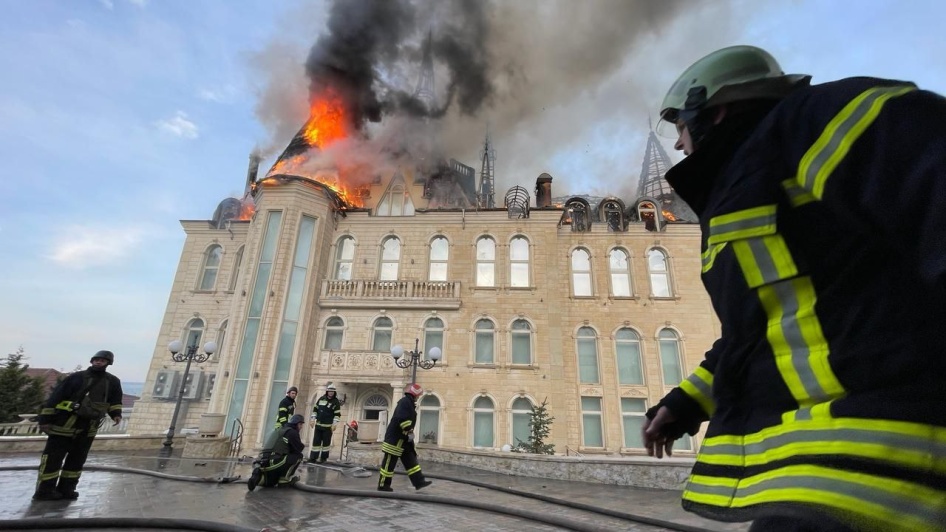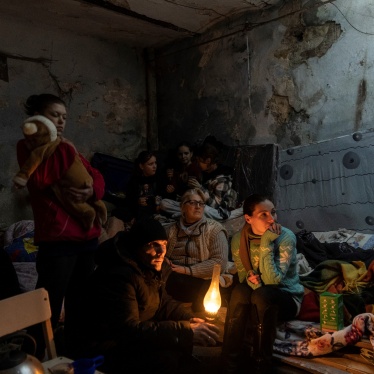(Kyiv, May 29, 2024) – A recent Russian cluster munition strike on Odesa, Ukraine, that killed seven civilians and injured dozens more highlights the urgent need for all countries to join the international treaty banning these weapons, Human Rights Watch said today.
“Russia’s cluster munition strikes on Ukraine are a case study of the grave harm posed to civilians,” said Belkis Wille, associate crisis, conflict, and arms director at Human Rights Watch. “The many countries that have banned cluster munitions under the treaty have made great strides destroying stockpiles and clearing explosive remnants, but the continued use of these weapons increases the risk to civilians everywhere.”
Sixteen years on, 124 countries have ratified the May 30, 2008 Convention on Cluster Munitions but not Russia and Ukraine.
On April 29, 2024, a ballistic missile equipped with a cluster munition warhead scattered its payload of submunitions in and around one of the Odesa Legal Academy’s compounds on Odesa’s waterfront. Ukrainian authorities reported that among the civilians killed was a 4-year-old girl, who died of her injuries three weeks after the attack. The detonations started a fire that destroyed the roof of the residence of the Legal Academy’s president, who was injured in the attack.
Another 28 civilians were wounded, including a pregnant woman and a child. Most victims were in a popular park outside one of the academy’s buildings, which feature a seafront promenade used by joggers, dog walkers, and other civilians.
Cluster munitions are inherently indiscriminate weapons that pose a foreseeable and long-lasting danger to civilians. Delivered by artillery, rockets, missiles, and aircraft, cluster munitions open in mid-air to disperse multiple submunitions over an area the size of several city blocks. Many submunitions fail to explode on impact, leaving duds that can wound and kill like landmines for years, until they are located and destroyed.
The Ukrainian prosecutor general, Andriy Kostin, said that Russian forces carried out the attack using an Iskandar ballistic missile equipped with a cluster munition warhead. Dmytro Pletenchyk, a Ukrainian military spokesperson, said he immediately visited the site of the attack and observed remnants of the missile and the explosive submunitions it carried. Each Iskander-M 9M723-series ballistic missile contains 54 9N730 dual-purpose submunitions.
A security camera video of the attack posted to Facebook by Kostin on April 30 and verified by Human Rights Watch as taken on the Odesa waterfront near the academy shows at least 25 small explosions in under six seconds, indicative of the detonation of multiple submunitions from a cluster munition attack.
Human Rights Watch verified six videos and photographs from the attack and its aftermath posted on social media, including blood splatter and fragmentation damage caused by a detonation on the pavement, the fire at the legal academy, and remnants of the munition from the attack. One photograph shows production markings on a remnant of the missile’s engine section, identifying the weapon used as a 9M723 ballistic missile. Only Russia produces and stockpiles Iskander ballistic missiles equipped with cluster munition warheads.
Denys Sebov, the director of City Clinical Hospital No. 10 in Odesa, told Human Rights Watch that 15 injured people were transported there after the attack, all with injuries caused by metal fragments. He said that of those brought to the hospital, one 40-year-old woman died on arrival from fragmentation injuries to her neck, lungs, and heart; a 30-year-old man died of head trauma; and another man died after surgeons removed two fragments from his head. Some survivors were transferred to other medical institutions for further surgery.
Russian missiles and drones have regularly targeted Odesa’s port infrastructure. However, the April 29 strike site is eight kilometers from the port and not known to be close to any military objective, such as military buildings or supply storehouses.
Human Rights Watch has documented many Russian cluster munition attacks that have caused civilian casualties since the first day of the full-scale Russian invasion in February 2022. The cluster munition attacks began in Vuhledar, followed by subsequent attacks in Kharkiv, Mykolaiv, Chernihiv, Kherson, and other cities. The Russian cluster munition attack on the crowded Kramatorsk train station on April 8, 2022, remains one of the single deadliest incidents for civilians during the war.
The Ukrainian military has also used cluster munitions, including in the Izium area during 2022 that resulted in numerous deaths and serious injuries to civilians, Human Rights Watch said.
Four rounds of US transfers of cluster munitions to Ukraine since 2023 prompted the convention’s member countries, US lawmakers, and civil society groups to criticize the US actions. The US announced a fifth round on April 24. The US is also not a party to the cluster munitions convention.
In September 2023, the convention’s member countries condemned “any use of cluster munitions by any actor” and expressed “grave concern at the significant increase in civilian casualties and the humanitarian impact resulting from the repeated and well documented use of cluster munitions since 2021,” particularly in Ukraine.
Russia, Ukraine, and the US should each make a commitment that they will not further endanger civilian lives in indiscriminate attacks by joining the Convention on Cluster Munitions and destroying their stockpiles, clearing areas contaminated by cluster munition remnants, and assisting victims of the weapons. No country should transfer cluster munitions given the international norm prohibiting any transfer of these weapons.
Russia and Ukraine should promptly compensate victims and their families for loss of life and limb, or access to use of land.
“The deaths and injuries to civilians in Odesa from cluster munitions sadly won’t be the last time civilians are harmed by these weapons,” Wille said. “Concerted international pressure is needed not only to end cluster munition use in Ukraine but throughout the world.”









